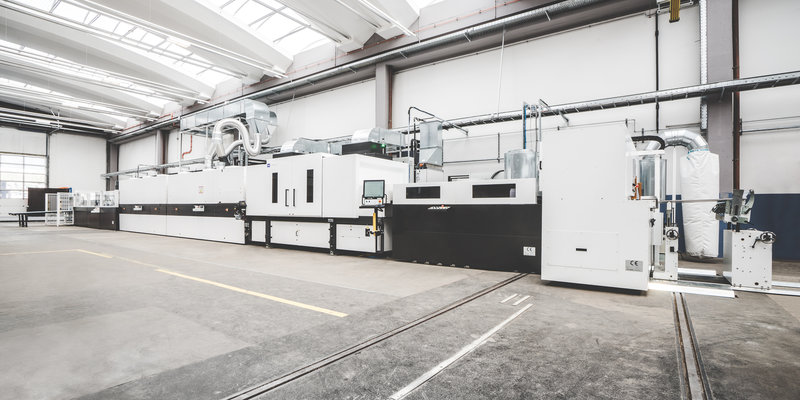 We didn’t just buy a machine, we bought a whole system involving software, analytical tools and calculation tools, so we are very happy that we don’t need any additional software
We didn’t just buy a machine, we bought a whole system involving software, analytical tools and calculation tools, so we are very happy that we don’t need any additional software
Rondo’s digital transformation for its corrugated packaging business has been driven by brands who have opened their minds to the new wave of opportunities from sustainable production where flexibility and time to market are crucial driving factors.
Digital corrugated production is now going up by 25-30% a year for Austria-based Rondo St Ruprecht an der Raab, one of six plants in Europe for the family-owned Rondo Ganahl Group. The company specializes in corrugated board production using flexo, offset and digital technologies. It has never looked back since making a leap of faith two years ago and becoming one of the world’s first users of the Durst SPC 130 water-based technology.
Managing all data through the Durst workflow with its sophisticated color management, analytical tools and variable data creation, has made a strong and positive difference – all provided through Durst Professional Services.
Robert Posch, Operations Manager at Rondo St Ruprecht an der Raab, said: “We didn’t just buy a machine, we bought a whole system involving software, analytical tools and., calculation tools, so we are very happy that we don’t need any additional software. The brand Lindt & Sprüngli, as an example, has extremely dark and powerful red colours, as well as brown. With the powerful Color management features, we have been able to reproduce them accurately and we have matched their demands.”
Mr Posch added: “We are looking forward to working with Koenig & Bauer and Durst together because we see huge future potential with the software and what we hope will be the perfect printing machine. With experience of big industry, both Durst and Koenig & Bauer are excellent, robust engineering companies with world-class expertise. Certainly, we have had a very positive impression of the SPC 130 machine and from the staff right from the start.”
Karl Pucher has been the Managing Director at for Rondo St Ruprecht an der Raab for the last eight years. “We had been talking about getting into digital printing for a long time and for Rondo it was something new,” he said. “We had to change a lot of processes and took a lot of risk. We have made a lot of improvements in the processes. Sales are now racing ahead every month. Customers are making repeat orders, which is very important, so we are very happy that we took this decision. Our corrugated business is going up by around 20 to 30% every year and we see that this is a fast-growing business for the next years and soon we plan to go for a full three-shift operation. The share of digital printing was at first around 5 to 10% of our overall business, but we expect this to double within the next couple of years.
“It’s a known fact that brand owners were in love with the offset printing because of the quality, but since we have had digital printing we have transferred lot of offset business to digital because of shorter lead times, initiation costs and there is no difference in quality between offset and digital for many applications. Quality is extremely important for the brand owners, but it is not the topic anymore.
About 90% of the Rondo digital printing business is for the food industry. Brand owners have many more products compared to a few years ago and shorter lead times to market. “Lindt & Sprüngli is one example where we used to plan months ahead for Christmas, Easter and summer editions and needed to keep high levels of stock,” said Mr Pucher. “Now with digital technology we can be extremely flexible. Lindt & Sprüngli can create a new order that we can produce digitally and have in the shops within weeks.”
Mr Pucher added: “Digital printing is also providing answers for the global debate on the use of plastic packaging, which obviously extends to food and safety. Using the new food safety compliant inks in primary and secondary packaging means we can create corrugated board packaging to be used as an environmentally friendly alternative to plastic. The SPC 130 with its water-based technology from Durst is providing the solutions that we need to delivery to the food industry.”
www.durst-group.com